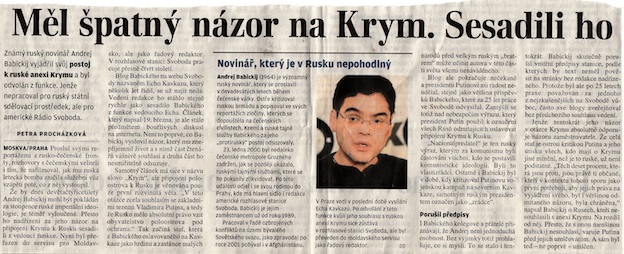BBG Watch Media
In an interview with a major Czech newspaper Lidove Noviny, former Radio Free Europe / Radio Liberty (RFE/RL) star war correspondent Andrei Babitsky said that he was fired last year by U.S. taxpayer-funded media organization because of a video he shot in Ukraine showing bodies of civilians who allegedly were killed by the Ukrainian armed forces.
It is not clear why Babitsky decided to speak now publicly about his dismissal which happened in September 2014. There has been no public reaction to the interview, which was published Sunday, from RFE/RL management in Prague or from the Broadcasting Board of Governors (BBG), a federal agency in Washington which oversees U.S. funded international media outlets.
Kremlin-controlled media and independent Russian websites reported extensively on the Babitsky interview. Russia’s state external news agency Sputnik International published a report on it in English, Radio Liberty Fires Reporter for Video of Civilians Killed by Kiev Forces, Sputnik, March 15, 2015.
Prior to his September 2014 dismissal, Babitsky was suspended earlier that year by RFE/RL management for writing that Russia’s President Vladimir Putin had the right to annex Crimea in order to protect the majority of the ethnic Russians who live on the peninsula. In the same article, Babitsky was critical of President Putin for human rights violations. Andrei Babitsky has been also a strong critic of President Putin’s war in Chechnya and was at one point kidnapped by the Russian security forces and later released.
In his latest Lidove Noviny interview Babitsky strongly defends the right of nationalities to self-determination and justified the Russian annexation of Crimea on those terms. His wife’s family lives in Crimea where he spends his summer vacations.
Czech journalist Petra Procházková pressed Babitsky to explain whether Putin’s actions did not violate international law and post-Cold War stability in Europe. She also asked him to explain how Putin’s annexation of Crimea would be different from Hitler’s annexation in 1938 of part of Czechoslovakia with a German ethnic minority.
Babitsky responded that the vast majority of people in Crimea wants to remain with Russia. Babitsky did not mention the original inhabitants of Crimea, the Crimean Tatars, who are strongly opposed to the Russian annexation.
In the Lidove Noviny interview, Andrei Babitsky also defended the right of ethnic Russians in eastern Ukraine to join Russia. He dismissed the interviewer’s suggestion that some of these Russians may have been victims of disinformation by the Kremlin controlled Russian state media.
During its entire history, Radio Free Europe /Radio Liberty journalists often disagreed with each other and with the American management. Most of the time, the management was able to resolve these disagreements among its talented staff. Radio Free Europe and Radio Liberty have a major role in helping victims of human rights abuses through fact-based news reporting.
In recent years, however, conflicts with journalists at RFE/RL appear to have multiplied due to what critics say is a confrontational and misguided management style.
Most recently, there have been reports that a highly respected woman journalist at Radio Liberty who for many years has specialized in human rights reporting in Russia may have been recently unjustly and unwisely dismissed due to a disagreement with her supervisor.
According to sources in the Russian human rights community, top Russian human rights leaders, who hold the woman journalist in high regard, wrote a letter to the Broadcasting Board of Governors (BBG) and its chairman Jeff Shell protesting her firing. In the letter they reportedly also expressed concern about poor employee morale in Radio Liberty’s Russian Service at the time of President Putin’s increasing clampdown on independent journalism in Russia.
Some of the same leading human rights and opposition leaders also strongly protested when the former RFE/RL American management fired dozens of Radio Liberty journalists in Russia in 2012. Most of them were rehired in 2013 when the BBG put distinguished journalist and media executive Kevin Klose in charge of RFE/RL. Management-labor relations had improved during his tenure, but he has since retired from RFE/RL which now does not have a permanent corporate president. This latest incident involving a woman reporter with an impeccable record and the protest letter to the BBG are not connected with the Andrei Babitsky case.
BBG Watch commented on management problems at RFE/RL in connection with Andrei Babitsky in early 2014.
We repost BBG Watch Commentary from April 9, 2014. It included an open letter from former Radio Liberty Russian Service director, Italian journalist, writer and Russia expert Mario Corti.
Had the BBG heeded his earlier advice, this latest controversy surrounding Andrei Babitsky and its exploitation by the pro-Kremlin media in Russia may have been avoided. More recent incidents involving at least one human rights reporter also could have been avoided. Better managers at all levels should be able to motivate talented, sometimes difficult, but often blameless and dedicated reporters. Managers must be able to prevent most if not all confrontations through dialogue and proper leadership.
Reaffirmation of freedom of speech and new leadership needed for RFE/RL — Mario Corti’s letter about Andrei Babitsky
April 9, 2014
BBG Watch Commentary
BBG Watch has received a letter to the editor written by former Radio Liberty Russian Service director Mario Corti. The author comments on the recent removal of a well-known RFE/RL journalist, Andrei Babitsky, from the position of the chief editor of RFE/RL’s “Caucasus Echo” website for apparently expressing a controversial opinion. Corti is an Italian journalist and author of several books published in Russia. Before joining RFE/RL, Corti publicized in the West the works of Soviet human rights activists and Samizdat writers. After leaving RFE/RL, Corti worked as a media consultant and manager in Russia. He now lives in Italy.
Mario Corti strongly defends Andrei Babitsky on the issue of freedom of expression even though he does not agree with a comment that apparently got Mr. Babitsky in trouble with his superiors. We fully share Mario Corti’s view that Vladimir Putin had absolutely no right to intervene in Crimea. We also applaud Corti’s defense of the principle of freedom of expression.
Mr. Babitsky did not explain his controversial comment about President Putin taking the population of Crimea under Russian protection and the rest of his article, where he defends human rights in Russia, appears to contradict his initial vague statement, or at least does not support it. But we agree with Mr. Corti that as in some other similar cases in the past, Radio Free Europe / Radio Liberty did not deal with this issue well. A well-run journalistic organization has procedures for resolving such differences of opinion before they escalate and cause damage.
Babitsky is viewed as one of Radio Liberty’s most courageous reporters. Wikipedia article on Andrei Babitsky (Russian: Андрей Маратович Бабицкий, born September 26, 1964, in Moscow) describes him as “a Russian journalist and war reporter, who has worked for Radio Liberty since 1989, covering the 1991 August Coup, Civil War in Tajikistan and, most notably, both Chechen Wars from behind Chechen lines. Babitsky is most famous for his kidnapping by the Russian forces in January–February 2000 during the Second Chechen War and his 2005 video interview with Chechen warlord Shamil Basayev.” The interview with Basayev was first broadcast on ABC and incurred the wrath of Russian officials.
The interim RFE/RL management team has done overall a good job during the Ukraine/Russia emergency in terms of news output, but some key management problems remain unresolved and new ones have emerged. They have not been handled well at various levels of management, including the Radio Liberty Russian Service.
While RFE/RL’s management problems in Prague pale in comparison with the meltdown of news reporting and governance at the Voice of America (VOA) in Washington, RFE/RL urgently needs to have a new CEO with a clear vision of the mission in support of freedom of expression and ability to manage conflicts and differences of opinion in collaboration with its outstanding journalistic staff. (A management reform at VOA is even more urgently needed to protect VOA journalists, their mission, and the VOA Charter, as we pointed out in many other BBG Watch commentaries.)
While still functioning well as a multimedia organization, especially during the latest crisis in Ukraine, Radio Free Europe / Radio Liberty clearly suffers from the lack of strong central leadership after the sudden departure of former RFE/RL president Kevin Klose. He had introduced some significant reforms and restored RFE/RL’s journalistic reputation but did not finish some of the other promised reforms before he left.
In view of this latest incident and the growing conflict in Ukraine, the Broadcasting Board of Governors (BBG) should name a new RFE/RL president and CEO as soon as possible — someone who can not only promote the mission of media freedom and freedom of speech but who will also know how to manage a diverse staff and will put a stop to unfair treatment of foreign journalists employed in Prague. As we have urged in many other commentaries, the BBG must also deal as soon as possible with the severe management problem at the Voice of America.
Letter to the Editor of Free Media Online from Mario Corti
According to an article by Petra Prochazkova in Czech newspaper “Lidove Noviny” of April 7, 2014 (title in English: “He had the wrong opinion on Crimea. Removed”), which has just been brought to my attention, Andrei Babitsky, the chief editor of the RFE/RL Russian blog “Caucasus Echo,” was dismissed from his position for sharing Putin’s thesis that Russia had the right to take the population of Crimea under Russian protection.
Babistky’s statement, posted on the “Caucasus Echo” blog, consists just of a short one-sentence introductory note to a larger commentary, titled (in English) “It’s not about Crimea,” which is harshly critical of Vladimir Putin for his calling as “traitors” those Russians who do not agree with Crimea’s annexation.
Let me make it clear, before I get to the point I want to make, that my opinion is diametrically opposite to that of Andrei Babitsky’s: I think that Russia has annexed Crimea in violation of its own commitment to respect the independence, sovereignty and the existing borders of Ukraine (see the Budapest Memorandum on Security Assurances signed by Russia, USA and Great Britain on December 5, 1994).
However, should it be true that Babitsky was dismissed from his post for expressing an opinion in a commentary—which is a legitimate genre of journalism and which by definition expresses personal views of its author—then the case would be similar to that of Moscow State Institute of Foreign Relations (MGIMO) professor Andrei Zubov, who was recently sacked for his criticism of Russia’s adventure in Ukraine. Babitsky was not fired from RFE/RL, but he was removed from his position as the chief editor of “Caucasus Echo.”
The dismissal of Andrei Zubov was announced in Moscow by his employer – MGIMO in a public statement, and was subsequently publicized worldwide. Zubov’s case was also extensively discussed in quite a number of RFE/RL broadcasts and on its webpages.
As far as Andrei Babitsky is concerned, an internationally well known journalist, RFE/RL in Prague and the BBG in Washington have yet to provide to the public a valid reason for removing him from his previous position.
The motto of RFE/ RL has always been, and I very much hope it still is, a quotation from article 19 of the Universal Declaration of Human Rights: “everyone» has «the right to… seek, receive and impart information and ideas… regardless of frontiers.”
I worked for many years at Radio Liberty, and I always thought, and was taught there, that RL must be and indeed is a paragon of freedom of speech. It cannot be otherwise. How could RFE/RL be effective and convincing to its target audience if it betrayed the principles it tries to promote, first and foremost freedom of opinion?
What is certain is that Babitsky’s commentary was removed from the RFE/RL web page.
BBG Watch has recently published an Open letter by the Czech Helsinki Committee to the Czech Prime Minister (dated March 28, 2014) under the title “Radio Free Europe Violates Human Rights and Hospitality of the Czech Republic.” According to the letter RFE/RL has adopted labor policies providing no legal rights to its foreign personnel in the Czech Republic and inconsistent with RFE/RL mission statement: “to promote democratic values and institutions,” “strengthen civil societies by projecting democratic values,” “provide a model for local media….”
A similar concept was expressed in an editorial under the title “Equality With Precondition. Practice of Radio Free Europe Contradicts its Own Ideals”, published earlier in the same pro-American Czech newspaper “Lidove Noviny,”: “Prague headquarters of RFE/RL, while pretending to be a messenger of freedom, democracy and the rule of law, behaves as an employer as if though the principles it heralds are relevant ‘just’ for the whole planet but not for… that estimable organization itself.”
Incidentally, Andrei Babitsky is one of those foreigners deprived by RFE/RL of any defendable labor rights.
Again, should it be true that Babitsky was removed from his position for expressing an opinion, then RFE/RL, I believe, is betraying its own mission and putting at great risk its credibility with the audience.
I attach a link to the Russian text of Babitsky’s commentary and a scan of the article in “Lidove Noviny.”
Mario Corti


